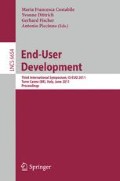Abstract
Computational thinking involves many different abilities, including being able to represent real and imaginary worlds in highly constrained computer languages. These typically support very selective kinds of perspectives, abstractions and articulation compared to the unlimited possibilities provided by natural languages. This paper reports findings from a qualitative empirical study with novice programmers, carried out with AgentSheets in a Brazilian public school. The driving research question was: How do meanings expressed in natural language narratives relate to computational constructs expressed in programs produced by novices? We used semiotic and linguistic analysis to compare meaning representations in natural and artificial texts (game descriptions in Brazilian Portuguese and Visual AgenTalk code). We looked for recurring relations and what they might mean in the context of computational thinking education. Our findings suggest that the semiotic richness of AgentSheets can be explored to introduce different aspects of computational thinking in principled and theoretically-informed ways.
Access this chapter
Tax calculation will be finalised at checkout
Purchases are for personal use only
Preview
Unable to display preview. Download preview PDF.
References
Basawapatna, A.R., Koh, K.H., Repenning, A.: Using scalable game design to teach computer science from middle school to graduate school. In: Proceedings of the Fifteenth Annual Conference on Innovation and Technology in Computer Science Education (ITiCSE 2010), pp. 224–228. ACM, New York (2010)
Blackwell, A.F., Green, T.R.G.: Notational systems - the Cognitive Dimensions of Notations framework. In: Carroll, J.M. (ed.) HCI Models, Theories and Frameworks: Toward a Multidisciplinary Science, pp. 103–134. Morgan Kaufmann, San Francisco (2003)
Cooper, S., Dann, W., Pausch, R.: Teaching objects-first in introductory computer science. In: Proceedings of the 34th SIGCSE Technical Symposium on Computer Science Education (SIGCSE 2003), pp. 191–195. ACM, New York (2003)
de Souza, C.S., Sedig, K.: Semiotic considerations on direct concept manipulation as a distinct interface style for learnware. In: IHC 2001 - IV Workshop de Fatores Humanos em Sistemas Computacionais, pp. 229–241. SBC, Porto Alegre (2001)
Elrad, T., Filman, R.E., Bader, A.: Aspect-Oriented Programming. Communications of the ACM 44(10), 28–32 (2001)
Frasca, G.: Simulation versus narrative: introduction to ludology. In: Wolf, M.J.P., Perron, B. (eds.) The Video Game Theory Reader, pp. 221–235. Routledge, London (2003)
Juul, J.: Games telling Stories? A brief note on games and narratives. Game Studies 1(1) (2001), Online at http://www.gamestudies.org/0101/juul-gts/
Kelleher, C., Pausch, R.: Using storytelling to motivate programming. Communications of the ACM 50(7), 58–64 (2007)
Maloney, J.H., Peppler, K., Kafai, Y., Resnick, M., Rusk, N.: Programming by choice: urban youth learning programming with scratch. SIGCSE Bulletin 40(1), 367–371 (2008)
Mor, Y., Noss, R.: Programming as mathematical narrative. Int. J. Continuing Engineering Education and Life-Long Learning 18(2), 214–233 (2008)
Myers, B.A., Pane, J.F., Ko, A.: Natural programming languages and environments. Communications of the ACM 47(9), 47–52 (2004)
National Research Council Committee for the Workshops on Computational Thinking (2010) Report of a Workshop on The Scope and Nature of Computational Thinking, Online at http://www.nap.edu/catalog/12840.html
Ogden, C.K., Richards, I.A.: The meaning of meaning, 8th edn. Harcourt, Brace & World, Inc., New York (1989)
Pane, J.F., Ratanamahatana, C.A., Myers, B.A.: Studying the language and structure in non-programmers’ solutions to programming problems. Int. J. Human-Computer Studies 54(2), 237–264 (2001)
Peirce, C.S.: The Essential Peirce, Selected Philosophical Writings, vol. 1, 2, Edited by Houser, N., Kloesel, C.J.W. Indiana University Press, Bloomington (1992, 1998)
Repenning, A., Ioannidou, A.: Agent-Based End-User Development. Communications of the ACM 47(9), 43–46 (2004)
Repenning, A.: Collaborative diffusion: programming antiobjects. In: Companion to the 21st ACM SIGPLAN Symposium on Object-Oriented Programming Systems, Languages, and Applications (OOPSLA 2006), pp. 574–585. ACM, New York (2006)
Repenning, A., Webb, D., Ioannidou, A.: Scalable game design and the development of a checklist for getting computational thinking into public schools. In: Proceedings of the 41st ACM Technical Symposium on Computer Science Education (SIGCSE 2010), pp. 265–269. ACM, New York (2010)
Resnick, M., Maloney, J., Monroy-Hernández, A., Rusk, N., Eastmond, E., Brennan, K., Millner, A., Rosenbaum, E., Silver, J., Silverman, B., Kafai, Y.: Scratch: programming for all. Commununications of the ACM 52(11), 60–67 (2009)
Sedig, K., Klawe, M., Westrom, M.: The Role of Interface Manipulation Style and Scaffolding on Cognition and Concept Learning in Learnware. ACM Transactions on Computer-Human Interaction 8(1), 34–59 (2001)
Author information
Authors and Affiliations
Editor information
Editors and Affiliations
Rights and permissions
Copyright information
© 2011 Springer-Verlag Berlin Heidelberg
About this paper
Cite this paper
de Souza, C.S., Garcia, A.C.B., Slaviero, C., Pinto, H., Repenning, A. (2011). Semiotic Traces of Computational Thinking Acquisition. In: Costabile, M.F., Dittrich, Y., Fischer, G., Piccinno, A. (eds) End-User Development. IS-EUD 2011. Lecture Notes in Computer Science, vol 6654. Springer, Berlin, Heidelberg. https://doi.org/10.1007/978-3-642-21530-8_13
Download citation
DOI: https://doi.org/10.1007/978-3-642-21530-8_13
Publisher Name: Springer, Berlin, Heidelberg
Print ISBN: 978-3-642-21529-2
Online ISBN: 978-3-642-21530-8
eBook Packages: Computer ScienceComputer Science (R0)

